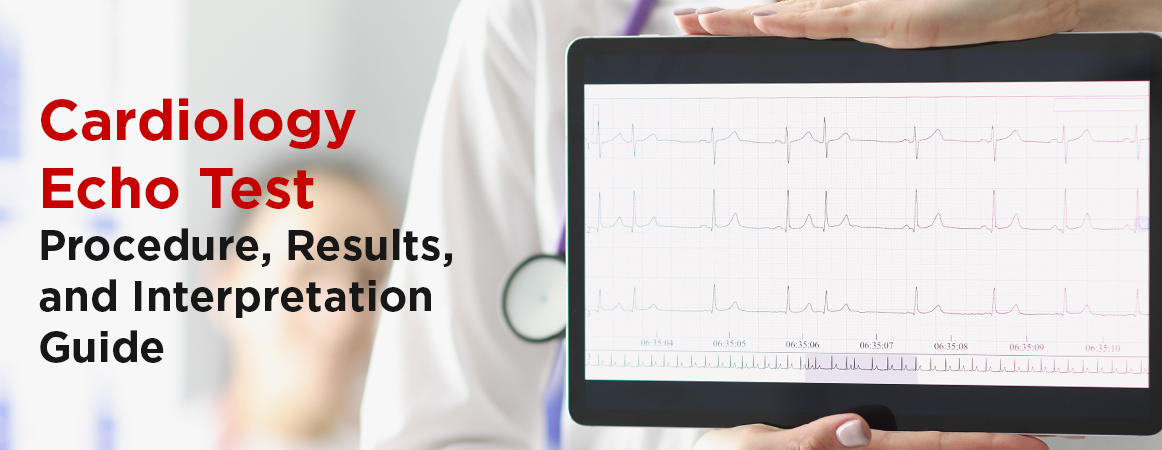
You might be unsure of what a cardiology echo test is and what to anticipate if your doctor has suggested it. Don’t worry, this article will provide you with all the knowledge you need.
Echo tests are commonly used to diagnose heart conditions such as heart failure, valve diseases, and congenital heart defects. This guide aims to provide an overview of the Cardiology Echo Test procedure, the results it provides, and how to interpret those results. You can get the test done at the MMI Hospital, the best cardiology hospital in Karachi where you can consult the top cardiologist in Karachi.
A cardiology echo test, also known as an echocardiogram, is a non-invasive diagnostic test that uses sound waves to produce images of the heart’s chambers, valves, and blood vessels. This test helps doctors evaluate the structure and function of the heart, identify any abnormalities, and assess overall cardiovascular health.
The cardiology echo test is a painless and straightforward procedure that typically takes between 30 and 60 minutes to complete. The test is performed by a trained technician or sonographer in a medical facility or a cardio hospital in Karachi.
During the test, the patient lies down on a bed while the technician places small electrodes on the chest to monitor the heart’s electrical activity. Then, the technician applies a gel to the chest and uses a transducer, a small handheld device, to send high-frequency sound waves through the chest. The sound waves bounce off the heart’s structures and produce images that are displayed on a screen.
The technician may ask the patient to change positions or take deep breaths during the test to get a better view of the heart’s structures. The technician may also use a Doppler ultrasound to evaluate the blood flow through the heart and blood vessels.
After the cardiology echo test, the doctor will review the images and provide a report with the results. The report will include information on the size and shape of the heart, the thickness of the heart walls, the function of the heart valves, and the blood flow through the heart and blood vessels.
The doctor will interpret the results and provide a diagnosis if there are any abnormalities or concerns. The diagnosis may include conditions such as heart disease, heart valve problems, heart failure, or congenital heart defects.
Understanding the results of a cardiology echo test can be challenging, as there are many technical terms and measurements involved. Here is a guide to help you understand the most common terms and measurements used in an echocardiogram report.
The ejection fraction calculates the volume of blood that is pumped from the left ventricle of the heart with each beat. A normal EF is between 50% and 70%. A lower EF may indicate heart failure or a weakened heart muscle.
LVH refers to the thickening of the heart’s left ventricle walls, which can be caused by high blood pressure or other conditions. LVH can increase the risk of heart disease, heart attack, and stroke.
Valvular regurgitation occurs when the heart valves do not close properly, causing blood to leak back into the heart. The severity of valvular regurgitation is graded on a scale from mild to severe, depending on the amount of blood that leaks back into the heart.
Valvular stenosis occurs when the heart valves become narrow, causing restricted blood flow. The severity of valvular stenosis is graded on a scale from mild to severe, depending on the amount of restriction in blood flow.
Pericardial effusion occurs when there is an abnormal amount of fluid in the sac that surrounds the heart. A moderate amount of pericardial effusion is typical, but an excessive quantity might strain the heart and lead to complications.
If you are unclear about what your results mean, speak with your doctor at a cardiac hospital in Karachi. You can feel safe and comfortable knowing that a cardiac echo is an easy test to undergo if you or a loved one needs one. The echo cardio test can have various outcomes and is conducted for several different purposes.
Dehydration occurs when your body loses more fluids than it takes in, leading to an…
Recovering from appendix surgery, also known as an appendectomy, requires careful attention to diet and…
Pakistan has experienced severe heat waves in recent years, with Karachi frequently being one of…
When it comes to cardiac care, selecting the right heart surgeon in Pakistan is crucial.…
Dealing with diarrhea, commonly referred to as loose motion, can be distressing and inconvenient. Understanding…
Parenthood, especially during the newborn phase, involves navigating various challenges, one of which is cluster…